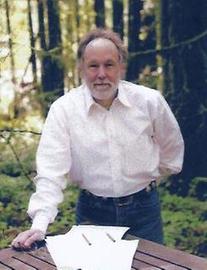 Barry Lopez, "a lyrical writer who steeped himself in Arctic wildernesses, the habitats of wolves and exotic landscapes around the world for award-winning books that explored the kinship of nature and human culture," died December 25, the New York Times reported. He was 75. Lopez, who won the 1987 National Book Award (nonfiction) for Arctic Dreams (1986), "embraced landscapes and literature with humanitarian, environmental and spiritual sensibilities that some critics likened to those of Thoreau and John Muir."
Barry Lopez, "a lyrical writer who steeped himself in Arctic wildernesses, the habitats of wolves and exotic landscapes around the world for award-winning books that explored the kinship of nature and human culture," died December 25, the New York Times reported. He was 75. Lopez, who won the 1987 National Book Award (nonfiction) for Arctic Dreams (1986), "embraced landscapes and literature with humanitarian, environmental and spiritual sensibilities that some critics likened to those of Thoreau and John Muir."
Last September, Oregon's wildfires destroyed much of his property. Lopez's wife, Debra Gwartney, told NPR that he lost an archive storing most of his books, awards, notes and correspondence from the past 50 years, as well as much of the forest around the home. "He talked a lot about climate change and how it's so easy to think that it's going to happen to other people and not to you," she said. "But it happened to us, it happened to him personally. The fire was a blow he never could recover from."
In a 2005 Guardian piece, British writer Robert Macfarlane observed: "Throughout his writings, Lopez returns to the idea that natural landscapes are capable of bestowing a grace upon those who pass through them. Certain landscape forms, in his vision, possess a spiritual correspondence. The stern curve of a mountain slope, a nest of wet stones on a beach, the bent trunk of a windblown tree: These abstract shapes can call out in us a goodness we might not have known we possessed."
Lopez's book Of Wolves and Men (1978) was a National Book Award finalist and won the John Burroughs Medal and the Christopher Award. The Times noted that his fiction, "a shelf of novels and short stories, reflected his humanist convictions, a blend of adventure, intimacy, ethics and identity." His other works include Light Action in the Caribbean (2000); Resistance (2004); Outside: Six Short Stories (2014); Crow and Weasel (1990); Horizon (2019); About This Life: Journeys on the Threshold of Memory (1998); and Crossing Open Ground (1989).
"Since Barry's death on Christmas Day, I have been thinking most of all about the example he set for those of us who try to write about our relationship with the Earth," author Pam Houston wrote in the Los Angeles Times. "He traveled to the Arctic, the Galapagos, Kenya, the Grand Canyon, Antarctica, Namibia, Australia's Nullarbor Plain, not to see them but to learn them. He knew so much, but I think what I admired most about him is that he also knew what he didn't know. He often said that to allow for mystery in your life, to admit what you don't know, is to allow yourself an extraordinary freedom. One goal of his traveling, of his writing, was to allow that mystery to deepen.
"He knew how to listen, how to enter a room and be quiet and wait. He spent his entire life listening--to the land, of course, and also and especially to the people indigenous to the land, people who had been caring for the land sustainably for 5,000 or 10,000 or 20,000 years. He recognized and respected their deep, land-based history, knew they were better attuned to nuance in their surrounding landscapes, admired the way they lived 'in a kind of ethical unity with a place' where 'their bonds to the earth are as much moral as biological.' He called their way of living 'a fundamental human defense against loneliness.' "
In his Guardian piece, McFarlane had noted: "Perhaps the best way to think of Lopez is as a postmodern devout. His prose--priestly, intense, grace-noted--carries the hushed urgency of the sermon. Irony and ambiguity are not in his repertoire. His is an unshadowed style, 'transparent as a polished windowpane.' "

